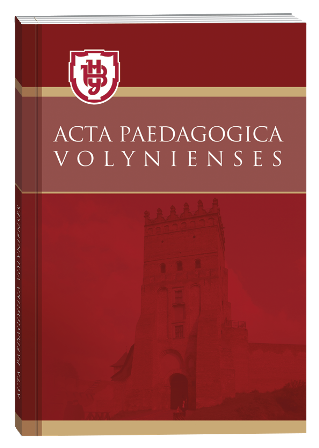DEVELOPMENT OF NATURAL AND SCIENTIFIC COMPETENCE IN PRIMARY AND SECONDARY SCHOOL STUDENTS
DOI:
https://doi.org/10.32782/apv/2023.2.7Keywords:
student, school, competence, natural and scientific competence, regularity, knowledge, ability, skills, environmentAbstract
The article analyzes modern trends in the development of natural and scientific competence among primary and secondary school students. It was found that quality education is one of the main signs of the education of society, the driving force of scientific and technological progress. Among the main competencies to which the New Ukrainian School draws attention, it is worth paying special attention to the development of competencies that form in students an idea of a holistic picture of the world, the laws and regularities according to which the environment functions. Separate attention is paid to natural and scientific competence, which is an important component of modern education. It has been found that this competence is manifested in the formation of curiosity, aspirations for searches and research of the surrounding world, formulation of assumptions, conclusions based on conducted experiments, knowledge of oneself and the surrounding world through observation and research. In scientific and methodical research, it was established that a person who possesses natural and scientific competence is able to evaluate various natural and technological phenomena, on the basis of previously acquired theoretical and practical knowledge, abilities, skills, social experience and personal values, is able to make and substantiate forecasts, propose methods of solving problematic issues from a scientific standpoint, describe and evaluate the reliability and objectivity of data, analyze and interpret these data and draw appropriate conclusions, evaluate scientific arguments and evidence from various information sources. The article emphasizes that the issue of determining the components of natural and scientific competence of primary and secondary school students is at the stage of active discussion and development, and therefore requires further research.
References
Гончаренко С. Український педагогічний словник. Київ : Либідь, 1997. 376. С. 139.
Зайченко І. В. Педагогіка. Київ : Літера, 2016. С. 128.
Закон України «Про повну загальну середню освіту» (2021). URL: https://zakon.rada.gov.ua/laws/show/463–20#Text (дата звернення 14.05.23).
Кабінет Міністрів України (2011, Лист. 23), Постанова № 1392 «Про затвердження Державного стандарту базової і повної загальної середньої освіти». [Електронний ресурс]. Режим доступу: https://zakon.rada.gov.ua/laws/show/1392–2011-%D0%BF (дата звернення 14.05.23).
Нова українська школа. Концептуальні засади реформування середньої школи [Електронний ресурс] / Міністерство освіти і науки України. К. : МОН України, 2016. 40 с. Режим доступу: https://mon.gov.ua/storage/app/media/zagalna%20serednya/nova-ukrainska-shkola-compressed.pdf (дата звернення 14.05.23).
Типові освітні програми Нової української школи. Київ : Світоч, 2019. 336 с.
Черненко Г. (2018). Особливості вивчення природознавства молодшими школярами в Україні (початок ХХІ століття – сьогодення). Науковий збірник «Актуальні питання гуманітарних наук: міжвузівський збірник наукових праць молодих вчених Дрогобицького державного педагогічного університету імені Івана Франка», Том 18, № 18, С. 184–192.
Непорожня Л. В. Розвиток природничо-наукової компетентності засобами підручника з фізики. Проблеми сучасного підручника. 2017. С. 279–287.
PISA: природничо-наукова грамотність / уклад. Т. С. Вакуленко, С. В. Ломакович, В. М. Терещенко, С. А. Новікова; перекл. К. Є. Шумова. Київ : УЦОЯО, 2018. 119 с.







